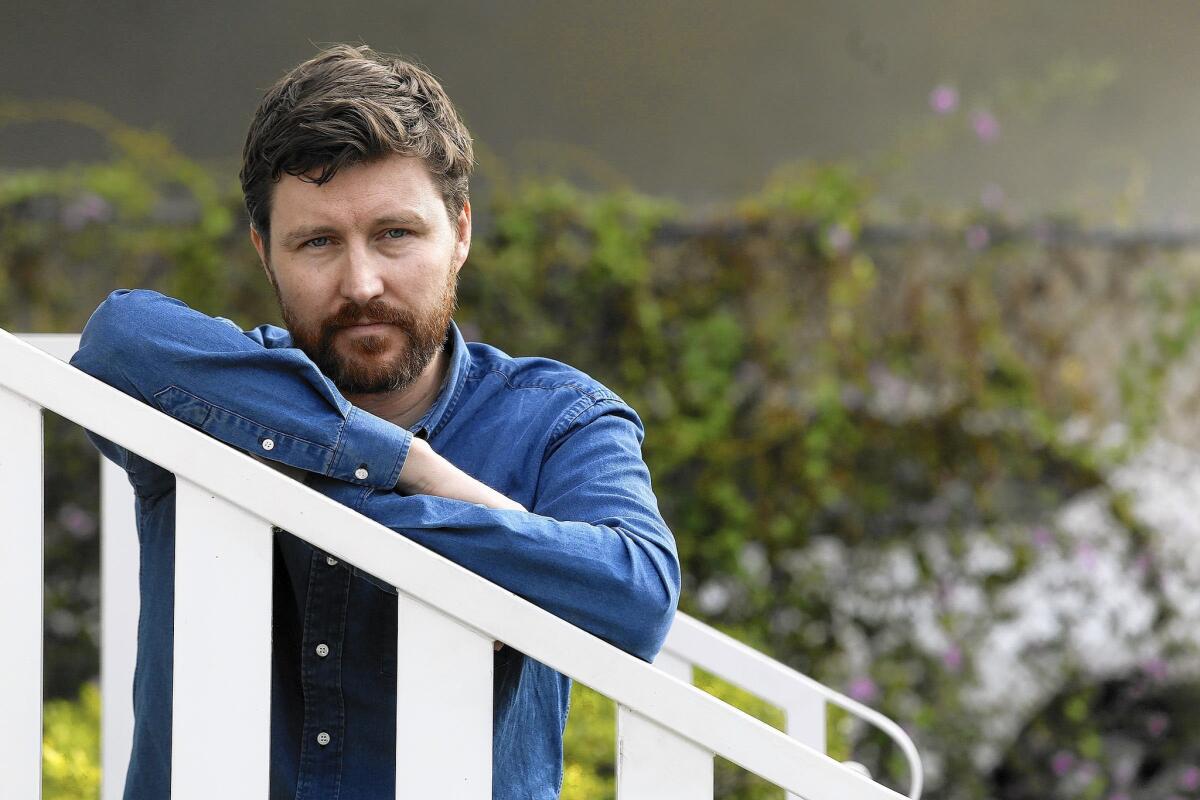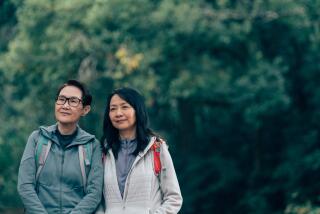Q&A: Andrew Haigh’s ‘Looking’ characters search for love

British filmmaker Andrew Haigh grew up loving challenging films as an usher at London’s National Film Theatre. Then he made one as the writer and director of “Weekend,” a deep and fleeting romance between two men. Haigh is now the co-creator of “Looking,” HBO’s heartfelt series about three gay men finding their way in San Francisco. Entering their second season Sunday night, the characters are still searching for true, sustainable love.
You bill “Looking” as the search for something real, and the show comes at a time when there is an expectation that gay life ends in marriage. These characters struggle with that.
To me, it feels like a true reflection of how I am and how everyone I know is. I do feel like the idea that just because you can do something, or that life is different, and that you should be able to achieve that is just not true. We are all muddling through our lives doing the best we can, making good decisions, making wrong decisions, making stupid decisions, and I think we never really ... or it’s very hard for us to find that kind of contentment and that happiness that we are looking for because the truth is that we don’t really know what that is. So it always makes sense to me that the characters are not living 100% fulfilled lives.
This doesn’t feel like a show that will end like “Sex and the City” with a big wedding episode.
I don’t understand an ending that is too closed off unless there is a death. That is the only time things are truly closed off. I don’t believe in “happy ever after” at all as a concept. But I certainly want this show to be about these guys trying to understand who they are. I don’t need to see what’s after that. For me, it’s just about people understanding who they are and becoming their authentic self.
What would you say to people who worried that “Looking” reinforced a damaging stereotype that gay men are so narcissistic and sex-obsessed that they can’t commit to a partner or much of anything?
For me, it’s not perpetuating anything, and I don’t think it’s necessarily a true description of this show or these characters. Yes, they are thinking about sex just like every other person in the world is thinking about sex, and they are thinking about whether they can commit to someone or be intimate with someone. But there are other things going on in their lives, like what they are doing with their careers, what they are doing with their friends.
For me, it’s very important that shows about gay people are messy and complicated and are truthful about what we do. And to say that gay people aren’t wanting to have sex with people is just not true because clearly we do. So for me, it was about finding a balance in the show and being honest about it and not being embarrassed about it. Sometimes we want to have sex, sometimes we want to have relationships with people and sometimes we turn people away who we shouldn’t turn away, and to me, the more the gay-themed material shows flawed individuals, the better it will be because that is when you will be truly accepted and not have an idealized version of what a gay person is or what we might like to see on the screen.
What recent representations of gay life do you especially admire or dislike?
There is just so little out there, and that’s why people get so frustrated with us sometimes. They say, “Why am I not in this show?” Like I’ve had emails from people saying, “I’m a 45-year-old man who is happily married with kids. Why am I not in the show?” And I’m like, well, the show is not about you. It’s about these people. There are so many different people within the so-called community. There are so many different desires, thoughts and feelings and everything, but there is still always that expectation that it should be reflective of everyone.
This series is set in San Francisco, the Emerald City of gay life, so we’re probably never going to see overt acts of homophobia, but do you find yourself still thinking about how these characters may have internalized the homophobia that they must have experienced in the past?
Living in San Francisco, you can’t tell a story about people being abused for being gay. Or maybe I should say it’s less likely in San Francisco. But I think there is some homophobia at the root for these characters. Like for me, their sexuality is still guiding them in their lives, and sometimes negatively. I think Patrick [Jonathan Groff] is still a character who has not completely accepted his sexuality, and I do think that’s why he is finding it hard to commit, why he is finding it difficult to have a relationship, and I do think that he still does have a certain expectation of what being gay is.
And I think that’s the thing: Our sexuality in our own past affects everything we do, but it’s in a much more subtle form now. It’s not so much, “Oh, my God, I hate myself for being gay.” It’s like, “You know what? I still don’t think I fit in.” What I find interesting about Patrick’s character is that I don’t think he fits into any world. He doesn’t feel like he fits into the straight world or necessarily in the gay world. To me, that seems to be the experience of a lot of gay men. When they come out of the closet they are expecting being gay to be a certain type of thing and then it’s not because, of course, it can encompass anything, so they are still trying to find their place.
To what extent is class going to be an ongoing concern in the show?
Class is really interesting to me, maybe because I’m from England where there is a pretty hideous, deep-rooted obsession with class. I don’t like the obsession with class, but it certainly interests me. It’s an inevitable part of everyone’s life, especially when there is such a division between who has money and who doesn’t have money. In America, it seems to be often more about wealth than it does about historical class position. I like being able to explore that to some degree. And I suppose I’m interested in how class prevents people from being able to fulfill their ambitions, and that’s the truth of it. If you don’t have money or you come from a background that doesn’t have money, it’s harder to achieve your ambition in life. It’s not that you can’t, but it becomes harder. Inequality is one of the worst things that can exist in our society, so I am interested in those kind of things.
Is class different in a gay context?
What’s interesting to me about being gay is that a friendship group can be more diverse in terms of class, ethnicity, age and all of those things because the common ground together is your sexuality. I think sometimes when that doesn’t exist, your common ground is that you all went to the same university or you all live in the same town where things are a lot more even. So I quite like that about the gay community. When I went to my first gay club all those years ago, it felt like a much more diverse place in terms of all those things than when I went to someplace that isn’t gay.
How would you like the show to be remembered?
I’m under no illusions that it’s the biggest show on television. That’s fine by me. I like things that feel small and feel intimate and get under your skin and where you start to care about the characters and you are made to engage with the story. I want people to come and engage with the story and work with it. I don’t want to just hand everything to them on a plate, so I just hope that it has some impact in that regard.
More to Read
The complete guide to home viewing
Get Screen Gab for everything about the TV shows and streaming movies everyone’s talking about.
You may occasionally receive promotional content from the Los Angeles Times.







